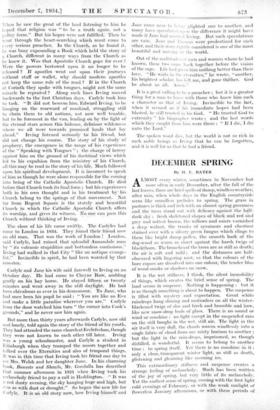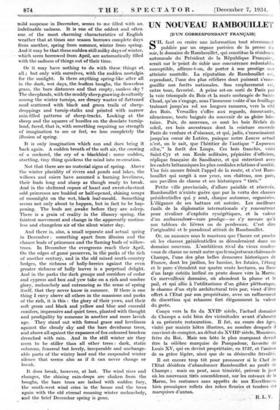DECEMBER SPRING
By H. E. , BATES
ALMOST every winter, sometimes in November but more often in early December, after the fall of the last leaves; there are brief spells of damp, windless weather, after rain, when whole days in the English countryside seem like soundless preludes to spring. The grass in pastures is thick and rich with an almost spring greenness and the trees stand out with delicacy against the half- dark sky : fresh skeletoned shapes of black arid red and grey and softest brown, the willows and osiers varnished a deep 'walnut, the trunks of sycamore and chestnut stained over with a silvery green fungus which clings to them like bright damp pollen, the smooth bark of the dog-wood as warm as claret against the harsh twigs of blackthorn. Thebranehes of the trees are as still as death; the air is soft and mild ; and the distances are half- obsctired with lingering mist, so that the colours of the bare copses arc dissolved into one colour, the tender blue of wood-smoke or shadows on snow.
It is the wet stillness, I think, the silent immobility of things, which' creates the brief sense of spring. The land seems in suspense. Nothing is happening : but it is as though something is about to happen. The suspense is filled with mystery and expectation. Great white raindrops hang shining and motionless on all the winter- blackened twigs of sloe and birch and bramble and haw, like new snow-drop buds of glass. There is no sound or wind or sunshine : no light except in the suspended rain on the still boughs in the wet, still air. The light in the air itself is very dull, the clouds woven mindlessly into a single fabric of cloud from one misty horizon to another ; but the light in the rain-drops,, imprisoned, as though distilled, is wonderful. It seems to belong to another time : to spring itself. Yet there is no sunshine in it : only a clear, transparent winter light, as still as death, glistening and gleaming like morning ice.
This extraordinary stillness and suspense creates a strange feeling of melancholy. Much has been written of the joy of spring, but very little of its melanchOlv. Yet the earliest sense of spring, coming with the first light cold evenings of February, or with the weak sunlight of flowerless January afternoons, or with these periods of mild suspense in December, seems to me filled with an indefinable sadness. It is one of the oddest and often. one of the most charming characteristics of English weather that at times one season borrows complete days from another, spring from summer, winter from- spring.. And it may be that these sudden still milky days of winter, which seem borrowed from April, are automatically filled with the sadness of things out'of their time. .
Or it may have nothing to do with these things at, all ; but only with ourselves, with the sudden nostalgia: for the sunlight. Is there anything spring-like after all in the dark, wet days, theleatless boughs, the flowerless grass, the 'bare distances and that empty, sunless sky ? The sheeplands, with the muddy sheepgnawing desultorily among the winter turnips, are dreary wastes of flattened' mud scattered with black and green trails of sheep- droppings and turnip-stalks and printed with narrow rain-filled patterns of sheep-tracks. Looking at the sheep and the squares of hurdles on the desolate turnip- land, faced, that is, with something requiring no strength of imagination to see or feel, we lose completely the • illusion of spring: It is only imagination which can and does bring it back again. A sudden breath of the soft air, the crowing, of a -cockerel, the cry of a blackbird : some sudden, startling, tiny thing quickens the mind into re-creation.
Not that there are no material signs of- spring. Above the winter placidity of rivers and ponds and lakes, the willows and osiers .hitire assumed a burning loveliness, their buds long and sharp as though ready to break. And in the sheltered copses of hazel and sweet-chestnut odd primroses are budded or half-opened, shining scraps of moonlight on the wet, black leaf-mould.. Something seems not only about to happen, but in fact to be hap- pening. The buds are . awake before they - are asleep. There is a grain of reality in the illusory spring, the faintest movement and change in the apparently motion- less and changeless air of the silent 'winter day.
And there is, also, ra small separate and actual spring in December : something apart from illusion and the chance buds of primroses and the naming buds of willow- trees. In December the evergreens ,reath their April. On the edges of ganiePreserves, iii the parks of the rich of another century, 'and in the old mixed south-country hedges, the richness of holly-berries against the even greater richness' of holly leaves is a perpetual delight. And in the parks the-dark groups and corridors of cedar and cypress and boi and yew take on a rich and sombre glory, melancholy and entrancing as, the sense of spring itself, that they never know in summer. If there is one thing I envy above all others in the-mansions and parks- of the rich, it is this : the glory of their yews, and their soft green and black and yellow and blue and emerald conifers, impressive and quiet trees, planted with thought and prodigality by someone in another and more lavish age. They stand out with formal grace and loveliness against the cloudy sky and the bare deciduous trees, and above all against the expanses of fox-coloured bracken drenched with rain. And in the still winter air they seem to be -stiller than all other trees : dark, static columns, funereal but lovely, inseparable and unchange- able parts of the wintry land and the suspended winter silence that seems also as if it can never change or break.
It does break, however, at last. The wind rises and changes, the shining rain-drops are shaken from the boughs, the bare trees are lashed with sudden fury, the south-west wind cries in the house and the trees again with the old eternal moaning winter melancholy, and the brief December spring is gone,



















































 Previous page
Previous page